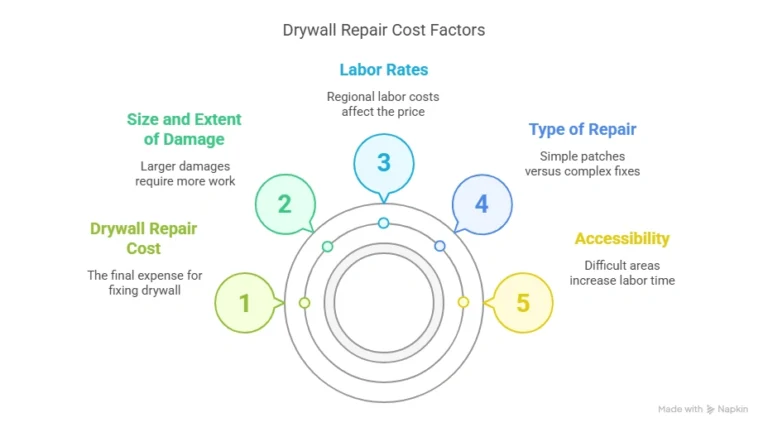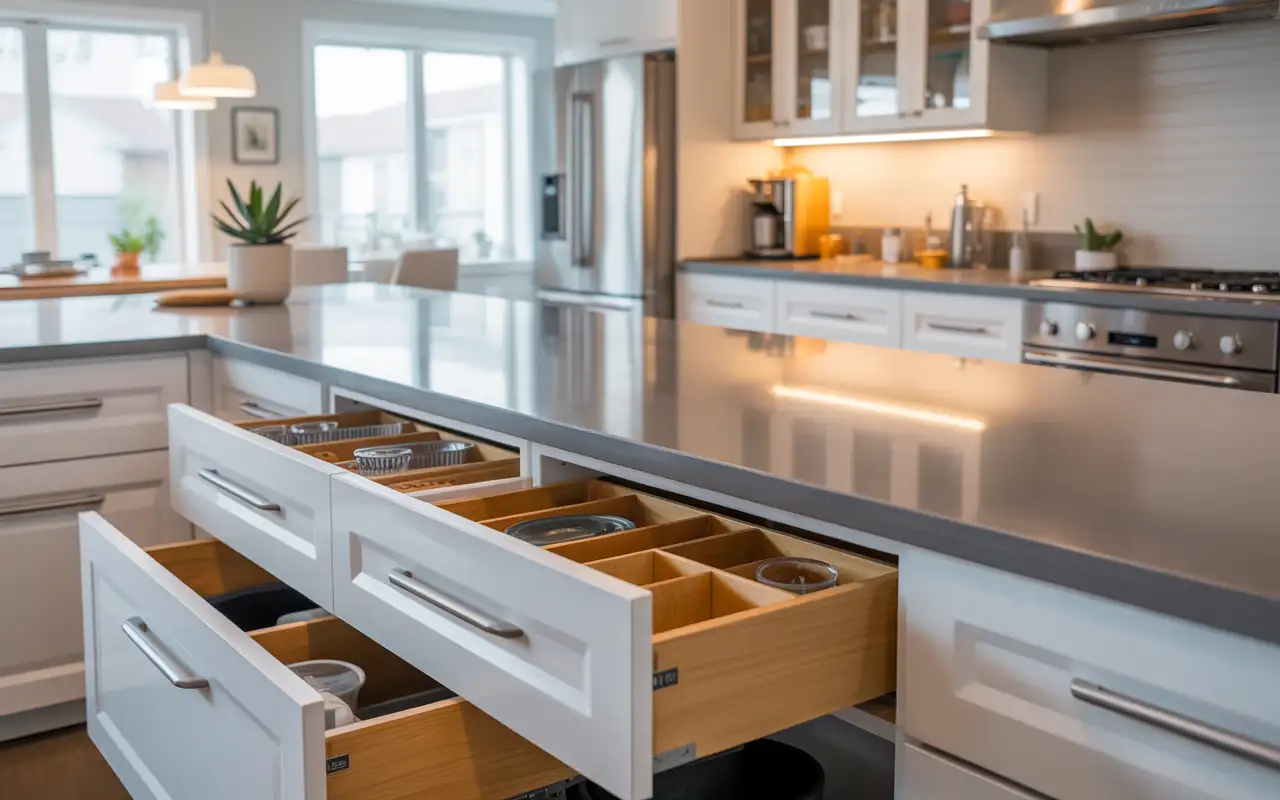The average cost of drywall restoration for households is roughly $300, but it can range from $75 to $880. It might cost just $50 to fix small nail holes, while major water damage could cost more than $1,500. The price varies depending on the size, kind, and severity of the damage, as well as whether texture-matching services are needed.
Knowing how much does drywall repair costs will help you plan your budget and avoid paying too much to a contractor. We’ll discuss the costs of materials, labor, and other factors that can impact your final charge. We’ll also discuss when to do it yourself and when to hire a professional.
Table of Contents
Factors That Affect the Cost of Drywall Repair

You can create a more accurate budget and avoid unexpected costs by understanding the factors that influence the price of drywall repair.
Damaged Area Size
The extent of the damage has a significant impact on the repair cost. An accidental nail pop only takes minutes to fix, but bigger jobs that require replacing walls necessitate new materials and significantly more work and materials to complete. For large jobs, contractors typically charge by the square foot, but for small ones, they usually charge a flat rate.
What Kind of Damage
Water damage is more than just dents in the walls; it also weakens drywall and may require a mold check; structural cracks mean there are problems with the foundation that need to be fixed before any cosmetic repairs can be made; and each type of damage requires a different set of tools and skills to fix.
Place in the World
Because of the high cost of living in San Diego, labor rates are higher than the national average. Skilled tradespeople can expect to make between $75 and $100 an hour in San Diego, but rates in rural areas may be 20 to 30 percent lower.
Needs for Texture Matching
It’s even more challenging to replicate current wall textures, and you need to be an expert to match orange peel, knockdown, and popcorn textures accurately. It might be easier and less expensive to repair walls that don’t join together.
How to get there and how to work
Ceiling repairs typically cost more than wall repairs because they often require access to hard-to-reach areas that necessitate the use of scaffolding or other specialized tools. Moving furniture also incurs additional costs, and protecting the floor requires more time and effort. Emergency or after-hours repairs also cost 150 to 200% more than normal prices.
Get to the bottom of things.
Repair jobs often find bigger problems while they are being fixed. Mold growth behind damaged drywall needs to be addressed, electrical and plumbing issues require immediate attention, and a professional should be hired to remove asbestos in older homes. Always add 10-15% more to your budget in case you find something unexpected while you’re working on your home improvement project.
Average Cost of Drywall Repair Per Square Foot
Figuring out how much a square foot costs can help you determine the price of larger fixes. This method is what most professionals use for jobs that exceed 10 square feet.
Fixing Small Things (less than 4,000 Square Feet)
Repairs for small problems, such as dents, nail pops, or doorknob holes that don’t cover more than 4 square feet, usually cost between $75 and $200. Since most materials cost less than $20 and work makes up most of the total, contractors typically charge a minimum service fee instead of charging per square foot.
Fixing Things in a Medium Amount
Medium repairs usually cost between $200 and $450 and involve several small holes or one bigger damaged area. They cost between $50 and $75 per square foot to install and take between 2 and 4 hours, with drying time in between coats of joint compound.
Repairs that are 10 square feet or bigger
The cost of major fixes is usually between $450 and $850 per square foot. At this size, it may be more cost-effective to replace the entire panel. The cost of materials and work should be between $1.50 and $3.50 per square foot. However, jobs that require matching textures could increase costs by up to $5 to $6 per square foot.
Material vs. Labor Breakdown
Approximately 60-70% of the repair cost is allocated to labor. In San Diego, professional handypersons charge between $75 and $100 per hour. The materials needed for simple fixes typically cost between $30 and $50. Professional-grade supplies usually cost more, but they produce better results. If you purchase your own supplies, you can save 15 to 20 percent; however, you must know exactly what you need for the job.
Drywall Repair Cost by Type of Damage

Different damage types necessitate different approaches and costs associated with repair work.
Nail Pops and Screw Pops
cost $50-100 for multiple repairs.
Houses settle over time, leading fasteners to push through. Fixing nail pops involves resetting fasteners, applying joint compound, and repainting. Most contractors offer multiple nail pop repairs in one visit for only $10-15 of materials costs. DIY solutions may cost even less!
Small Holes (Under 3 Inches)
Cost: $75-150 per hole
Doorknob strikes and furniture collisions often create these. A DIY kit from your hardware store usually costs $8-12; professional repair ensures invisible results while taking 30-60 minutes plus drying time to complete.
Medium Holes (3-8 Inches)
Cost: $150-300 Per Hole
The patching process will typically involve applying multiple coats of drywall mud, reinforced mesh patches to repair areas affected, matching texture matching as closely as possible and final texture and paint application in two visits (one for patching, then the second visit for finishing touches such as painting).
Cost to Repair Large Holes (8 Inches or Larger) | $300-500 for Repair (Existing Holes Only)
When fixing large holes (over 8 Inches), cutting new sheetrock to size often proves necessary, which entails taking steps such as taking away damaged sections, installing the new sheetrock, taping seams, adding multiple coats of compound, sanding down seams, applying numerous coats of compound, sanding it all back down before painting over. Full panel replacement makes more sense depending on its severity. More extensive damage may require full panel replacement instead.
Crack Repair in Walls or Ceilings for $100-450:
Surface or Structure? for Surface Cracks/Chinks; Foundation Movement/Temperature Change/ Poor Initial Install Often the source is foundation movement/ temperature shift/ poor installation which results in cracks in walls/ceilings being filled without first investigating their cause which leads to repeated problems and more costlier repair solutions being sought without first understanding why there were cracks to begin with! Performing repairs without investigating their origin can only bring repeat issues later down the road.
Drywall Ceiling Repair
Cost: $250-800
Ceiling work tends to cost more due to its difficulty, since gravity works against you, and special tools and techniques may be required to complete it successfully. Water stains on ceilings often indicate roof leaks or plumbing issues, which should be fixed first before proceeding with cosmetic damage repair work.
Water Damage repair.
Water can seriously compromise drywall integrity and should be addressed quickly to restore it to proper functionality. Any affected sections must be completely removed, while moisture testing ensures all surrounding areas remain dry, before installing moisture-resistant drywall in bathrooms and kitchens to help avoid future issues. Repair of this nature typically includes multiple trades such as plumbers, drywall specialists and painters working together for the best results.
Damage Caused By Mold-Related Contamination
Cost: $800-2,500.
Mold remediation should always come before any repair, as health considerations dictate this important task. Extensive mold may need permits and inspection, while proper ventilation and moisture control measures help avoid future outbreaks of this condition. Never undertake this repair on your own without proper training and equipment!
Corner Bead Damage
Costs Range From $150-350.
Damaged corner beads need complete replacement as furniture and foot traffic damage them over time. Replacement includes cutting out damaged sections before installing the new bead and blending it seamlessly to hide all evidence of wear and tear.
Average Drywall Installation Cost
Cost to Install Drywall: Sometimes it’s cheaper to replace the drywall than to install new one. The cost of installing new drywall typically ranges from $1.50 to $3.50 per square foot.
Standard Sheets for Drywall
Depending on its thickness, a 4×8 sheet can cost anywhere from $13 to $24. A half-inch thickness is good for most uses, while a five-eighths-inch thickness is better for fire defense and soundproofing. Material prices fluctuate over time; therefore, please get in touch with your supplier to obtain the most up-to-date quotes.
A green board, which is resistant to moisture, costs $15 to $30 per sheet and is commonly used in kitchens and bathrooms. Fireproof drywall, on the other hand, costs $20 to $35 a sheet and must be used between units in multi-family buildings. Mold-resistant drywall costs $18 to $32 per sheet, providing long-term protection in damp areas.
Professional assembly typically costs between $40 and $70 per hour for hanging, tapering, and mudding, which adds $40 to $60 to the total cost. Overall, installation work costs approximately $1 to $2 per square foot, and a room with an 8-foot ceiling typically spans around 500 square feet. Square feet in size, which would cost between $500 and $1000 in work costs alone.
Replacement Cost of Drywall
Replacement Is Better Than Repair
Repair may not always be sufficient when damage covers over 30% of a wall surface or when water damage causes multiple patches on one area that need to be patched together; similarly, old or poor-condition drywall throughout a room justifies complete replacement, as this would result in patchy repairs requiring continuous patchwork fixes and additional patch repairs being needed in some places.
Removal and Disposal
Drywall removal costs range between $0.50-1.00 per square foot in San Diego. This figure includes labor as well as disposal fees, which typically run $75-150 per ton; typical rooms generate between 1-2 tons of debris that must be cleared away, so factoring in dumpster rental into multi-room projects costs another $300-500.
Complete Room Replacement Costs
A standard 12-by-12 bedroom can typically cost $1,500-$800 for complete wall replacement, including removal, new materials installation, finishing and painting costs. Larger or complex layouts increase these costs proportionately.
Old Drywall Removal Cost
Before undertaking a new installation of drywall, it can add significant costs to a project. Removal costs should also be factored into any estimate for project expenses.
Standard Removal
Standard removal costs between $0.50-1.00 per square foot for labor to remove debris in clean ways that minimize dust and damage to surrounding areas. Additional fees may be added for multi-story work or difficult access.
Hazardous Material Removal
Homes built before 1980 could contain asbestos in joint compound and texture, testing which costs $200-400 and professional removal costing from $1,500-3,500 per room; lead paint on walls necessitating special precautions requires similar removal costs and may present the same risks; never attempt hazardous material removal yourself!
Debris Disposal Options
Rent a dumpster for $300-500 for DIY projects; contractors generally include disposal costs within their quote. Recycling drywall reduces disposal fees in certain locations; San Diego Home Remodeling handles this aspect as part of our service to avoid hidden charges or hidden costs.
Materials Needed for Drywall Repair
Understanding material costs helps you budget and prevents overpaying.
Essential Supplies
- Joint compound: $8-15 per gallon (covers 100-150 square feet)
- Drywall tape: $5-10 per roll (paper or mesh)
- Sandpaper and sanding sponges: $6-12
- Putty knife set: $15-30 for quality tools
- Primer: $15-25 per quart
- Matching paint: $25-45 per gallon
- Drywall screws: $6-10 per pound
Optional but Helpful
- Corner bead: $3-8 per 8-foot section
- Wallboard screw gun: $40-120 (Kobalt drywall screw gun offers good value at $50-70)
- Drywall saw: $8-15
- Utility knife: $6-12
- Texture spray gun: $30-100
Quality Matters
Cheap joint compound cracks and shrinks more. Professional-grade products cost 20-30% more but perform better. Premium paint covers better and lasts longer. Invest in quality for visible areas and high-traffic spaces.
How To Save Money on Drywall Repair
Smart planning reduces costs without sacrificing quality.
DIY Small Repairs
Handle nail pops and small holes yourself. A basic patch kit costs $10-15. Watch tutorial videos before starting. Practice on inconspicuous areas first. Know your limits—bad DIY repairs cost more to fix.
Bundle Multiple Repairs
Combine several small fixes into one service call. Contractors charge minimum fees for each visit. Fixing five nail pops at once costs less than five separate visits. Create a list of all needed repairs before calling.
Shop Around for Quotes
Get three estimates before committing. Prices vary 30-50% between contractors. Verify licenses and insurance. Check references and online reviews. The lowest bid isn’t always the best value.
Prevent Future Damage
Install door stops to prevent doorknob holes. Address water leaks immediately. Monitor humidity levels in bathrooms. Fix foundation issues before they crack walls. Prevention costs less than repeated repairs.
Time Your Repairs Strategically
Off-season rates (November through February) run 10-20% lower. Contractors offer discounts when work slows. Avoid emergency rates by addressing small problems before they worsen. Schedule non-urgent repairs during slower periods.
Buy Materials Yourself
Purchase supplies before the contractor arrives. This saves their markup of 15-25%. Get exact specifications first. Wrong materials waste money. Works best for simple repairs where needs are clear.
Consider Partial DIY
Handle demolition and painting yourself. Hire professionals for hanging, taping, and texturing. This hybrid approach cuts labor costs by 30-40%. Requires coordination and clear scope definition.
When To Call a Drywall Repair Professional
Some situations demand professional expertise.
Complex Repairs
Large holes, ceiling damage, or structural cracks need professional assessment. Texture matching requires specific skills and equipment. Corner repairs involve precise measurements and cuts. Professionals deliver invisible results that maintain home value.
Water and Mold Issues
Never DIY water damage without proper moisture testing. Mold remediation requires certification. Hidden damage often lurks behind visible problems. Professionals identify and address underlying causes, preventing recurring issues.
Time and Tool Constraints
Drywall repair takes time and specialized tools. Renting equipment costs add up quickly. Your time has value calculate opportunity cost. Professionals complete in hours what takes DIYers days.
High-Visibility Areas
Living rooms, entryways, and master bedrooms demand perfect results. Amateur repairs show under certain lighting. Professionals match texture and paint seamlessly. Poor DIY work hurts resale value.
Warranty and Insurance
Professional repairs come with warranties. Insurance claims often require licensed contractor documentation. Permits for extensive work need professional involvement. Protect your investment with proper documentation.
San Diego Home Remodeling Advantage
Our remodeling services in San Diego cover all repair types. We provide detailed estimates with no hidden fees. Licensed, insured professionals ensure quality results. We handle everything from small nail pops to complete room restoration. Our work meets San Diego building codes and carries a satisfaction guarantee.
Insurance Coverage for Drywall Repairs
Understanding insurance helps manage costs.
What’s Typically Covered
Sudden water damage from burst pipes usually qualifies. Storm damage and fire damage receive coverage. Vandalism and vehicle impacts qualify under most policies. Review your specific policy for coverage details.
What’s Not Covered
Normal wear and tear doesn’t qualify. Gradual water damage from slow leaks gets denied. Poor maintenance and settling issues fall on homeowners. Cosmetic repairs without structural damage rarely qualify.
Filing Claims Effectively
Document damage with photos and videos. Get professional assessment quickly. Keep repair estimates and invoices. File claims promptly delays complicate approval. Consider deductibles before filing small claims. Multiple claims increase premiums, so evaluate cost-benefit carefully.
Timeline Expectations for Drywall Repairs
Knowing how long repairs take helps planning.
Small Repairs (1-2 Hours)
Nail pops and minor holes finish in one visit. The joint compound needs 24 hours to dry. Painting happens during a second visit. The total timeline spans 2-3 days with drying time.
Medium Repairs (3-6 Hours)
Larger holes need multiple compound coats. Each coat requires 12-24 hours drying time. Texture matching adds another day. Complete repair takes 4-7 days from start to finish.
Large Repairs or Replacement (1-5 Days)
Removing old drywall takes 1-2 days. New installation requires another day. Taping and mudding need 2-3 days with drying time. Final texture and paint add 1-2 days. Total project spans 1-2 weeks.
Weather and Humidity Impact
High humidity slows drying. Cold temperatures extend curing time. Plan repairs during dry weather when possible. HVAC systems help control indoor conditions and speed projects.
Red Flags When Hiring Contractors
Protect yourself from bad contractors and inflated pricing.
Warning Signs
- Requests for large upfront payments (over 30%)
- No written contract or vague scope of work
- Pressure tactics or limited-time offers
- Unlicensed or uninsured operation
- No references or examples of past work
- Significantly lower bids than competitors (50%+ below average)
- Cash-only payment requirements
Verify Credentials
Check California Contractors State License Board. Confirm active insurance coverage. Review Better Business Bureau ratings. Read recent online reviews across multiple platforms. Ask for local references and actually call them.
Get Everything in Writing
Detailed scope of work prevents disputes. Fixed pricing beats time-and-materials for predictable costs. Payment schedules tied to completion milestones protect both parties. Warranty terms should be explicit and documented.
Conclusion
Drywall repair costs vary widely based on damage type, size, and location. Most San Diego homeowners pay $150-500 for typical repairs. Water damage and extensive work push costs higher. DIY handles small fixes, but professionals deliver superior results for complex jobs.
Addressing damage promptly, small problems become expensive repairs when ignored. Get multiple quotes and verify contractor credentials. Budget 10-15% extra for unexpected issues. Quality repairs maintain home value and prevent recurring problems.
San Diego Home Remodeling provides transparent pricing and expert repairs. We handle everything from minor fixes to complete room restoration. Contact us for a detailed estimate on your specific project.
FAQs
How much does drywall repair cost for a small hole?
Small holes under 3 inches cost $75-150 professionally. DIY repair using a patch kit runs $10-15 in materials. Professional repair ensures invisible results and typically takes 1-2 hours plus drying time before painting.
What factors increase drywall repair price most?
Water damage, mold, and texture matching drive costs highest. Ceiling repairs cost 30-50% more than walls. Emergency or after-hours service adds 50-100% premiums. Multiple small repairs cost less than several separate visits.
Can I fix drywall myself or should I hire a professional?
Fix nail pops and tiny holes yourself with patch kits. Hire professionals for holes over 3 inches, water damage, ceiling repairs, or texture matching. Amateur repairs in visible areas often look patchy. Poor DIY work costs more to fix later.
How long does drywall repair take to complete?
Small repairs take 1-2 hours plus 24-hour drying time. Medium repairs need 2-3 visits over 4-7 days. Large repairs or replacement take 1-2 weeks including all drying time. Weather and humidity affect timelines.
Does homeowners insurance cover drywall repair?
Insurance covers sudden damage from burst pipes, storms, or accidents. It excludes normal wear, gradual damage, and poor maintenance. Document damage immediately and get professional estimates. Consider your deductible before filing small claims.
What's the difference between repair and replacement cost?
Repair patches existing drywall for $75-500 typically. Replacement removes old drywall and installs new sheets for $1.50-3.50 per square foot. Replace when damage exceeds 30% of the wall or involves water damage throughout.
How much does water damage drywall repair cost?
Water damage repair runs $550-1,600 depending on extent. This includes removing damaged sections, moisture testing, and installing water-resistant drywall. Mold remediation adds $800-1,500. Always fix the water source first to prevent recurrence.







